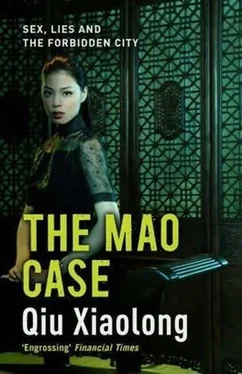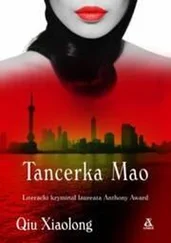“In Suzhou opera, a story has to be told from the very beginning. To understand the things that happened during the Cultural Revolution, you have to learn about it from the beginning.”
“You certainly talk like a Suzhou opera singer,” Chen said, “using tricks like enriching your speech with proverbs and tantalizing the audience with digressions before coming to a crucial point. Yes, please, start at the very beginning. The tea is just beginning to be tasty, and I’m all ears.”
“I was about your age at the time, Chief. Li Guohua, then the associate Party secretary, gave me an assignment – the first ‘major political case’ in my career. In those days, everyone believed wholeheartedly in Mao and the communist propaganda. A low-level cop, I was so proud of working for the proletarian dictatorship. I swore to fight for Mao just like those young Red Guards. So I secretly called that case a Mao case.”
“A Mao case?”
“Oh, it gave such a tremendous boost to my ego. It was just like pulling a large flag over my body as if it were a ‘tiger skin.’ The suspect in the case was named Teng, a middle school teacher accused of slandering Mao in his class. Born in a worker’s family and a member of the Communist Youth League, Teng was dating a girl with a good political family background, so he appeared to be an unlikely culprit. He had no motive whatsoever. So I went over to the school, where Teng had already been in isolation interrogation for days.”
“How did Teng commit this crime?”
“I’m coming to it, Chen. You cannot enjoy the steaming hot tofu if you are so impatient,” Old Hunter said, holding his cup high in the air. “In those years, Mao’s poems made up a large part of the middle school textbook. In class, Teng was said to have given a viciously slanderous interpretation of one of Mao’s poems. However, Teng insisted that what he presented to the class was based on official publications, that he had done a lot of research and preparation beforehand -”
“Hold on, which poem are you talking about?”
“Mao’s poem to his wife Yang Kaihui.”
“Ah, that one – ‘I lost my proud Yang, and you lost your Liu -’” Chen said, murmuring the first line of the poem. “In my middle school years, that poem was held up as a perfect example of revolutionary romanticism. In a flight of imagination, Mao described Kaihui’s loyal soul flying up to the moon, where the Moon Goddess danced and served of osmanthus-fermented wine to her, and she shed tears in a pouring rain upon learning of the victory of the Communist Party. Mao missed his first wife very much -”
“No, his second wife,” Old Hunter cut him short. “Mao actually had a first wife, Luo, at his old home in Hunan. According to Mao’s official biography, Luo and Mao got hitched through an arranged marriage. So he didn’t acknowledge Luo as his wife, though he had lived with her for no less than two or three years. Of course, no detail of their married life ever appeared in official publications. Then he fell in love with Kaihui and married her. This time, the marriage was seen as a revolutionary act, under the circumstances.”
“Old Hunter, you are a Mao authority. I should have known that earlier.” Chen raised his cup. “I’m sorry that it’s only tea, but cheers to your expertise.”
“Damn my expertise!” Old Hunter said, waving his hand. “Getting back to the case in question. According to Teng, he was trying to show his students what great sacrifices Mao had made for the revolution. His younger brother, his wife Kaihui, their children, and then the children by his next wife, Zizhen, all of them either died or were lost to their parents for the sake of revolution -”
“There’s nothing wrong with that,” Chen cut in again.
“That’s what I thought too. So I had a hard time straightening things out. Teng had been in isolation interrogation for days and was already a broken man only capable of repeating his statement over and over like a robot, ‘I just put together information from several books. The books must have it wrong.’
“So I interviewed his colleagues. They all declared that Teng did a conscientious job – at least on the surface. There was no copy machine in schools in the seventies. He had to work his butt off cutting stencils, copying passages from a number of books, proofreading all of it by himself, and paying for it out of his own pocket. I gathered together the information he had collected, including that concerning Mao’s second wife, Kaihui, and third wife, Zizhen. The material Teng distributed to his students was from official publications – and all written in an effort to eulogize Mao’s revolutionary spirit, no question about it.
“But here was the problem. One of the students read through the material and said in the class, ‘Teacher Teng, there’s a mistake. Chairman Mao couldn’t have married Zizhen that year.’ Now Teng was a very bookish and stubborn man. He happened to have the original book in his bag, so he took it out and double-checked the date in front of the class. ‘That’s correct. Study hard and don’t bother me.’ The student, being exasperated by Teng’s response and overly influenced by Mao’s theory of class struggle, reported him to the Mao Thought Propaganda Team in school, saying that Teng represented Mao as having married Zizhen when Kaihui was still alive.
“Now, in most official publications, there was no mention of the date of Mao’s marriage to Zizhen. It was taken for granted that he married her after the death of Kaihui. But in the sources Teng assembled, one text had a paragraph mentioning the date of Mao’s marriage to Zizhen, and another had a sentence containing the date of Kaihui’s death. The overlap of dates was unmistakable.”
Old Hunter paused for dramatic effect, picking up the teapot, but to his dismay, no water was left. He decided to go on without asking for more hot water. It was a crucial juncture in his story.
“It became evident that Mao was guilty of bigamy. And that meant a disaster for Teng. If he hadn’t been so devoted to accurate scholarship, he could have claimed that it was a typo. But confronted with the Mao Thought Propaganda Team, he insisted that he had carefully proofread all the material. What’s more, he produced the very book that gave the date of Mao’s marriage to Zizhen.”
“Who wrote the book?”
“Someone who had worked under Mao – Mao’s personal orderly. So the Mao Thought Propaganda Team had to put Teng in isolation interrogation, lest he keep blabbing. They sent a report to the police bureau, passing the problem on like a burning hot potato. And then the case came to me.
“After researching everything, I proposed to Li that we write to the author, asking for his cooperation. Li gave me a dressing down, declaring that I didn’t understand the complexity of the class struggle and that there was no possibility of contacting the author. Teng had to confess he slandered Mao, Li insisted, or at least to admit that it was a gross typo on his part. So I had no choice but to go on ‘investigating,’ turning myself into a mouthpiece for Mao’s famous quotation: ‘Leniency to those who confess their crime, and severity to those who resist.’ I tried to give advice to Teng by citing what proverbs I could think of, such as ‘A hero cuts his losses, for the moment’ and ‘You have to hang your head low under other’s eaves,’ but he wouldn’t listen. A couple of days later, he committed suicide, leaving a will written in blood, with only one sentence: ‘A long, eternal life to Chairman Mao!’ ”
He paused again to take a sip from the empty cup, feeling his throat suddenly dry.
“Now, that was as an acceptable conclusion according to Li. ‘The criminal committed suicide, aware of the punishment for his crime.’ So that was the end of the Mao case. About two or three months later, Mao himself passed away.”
Читать дальше












